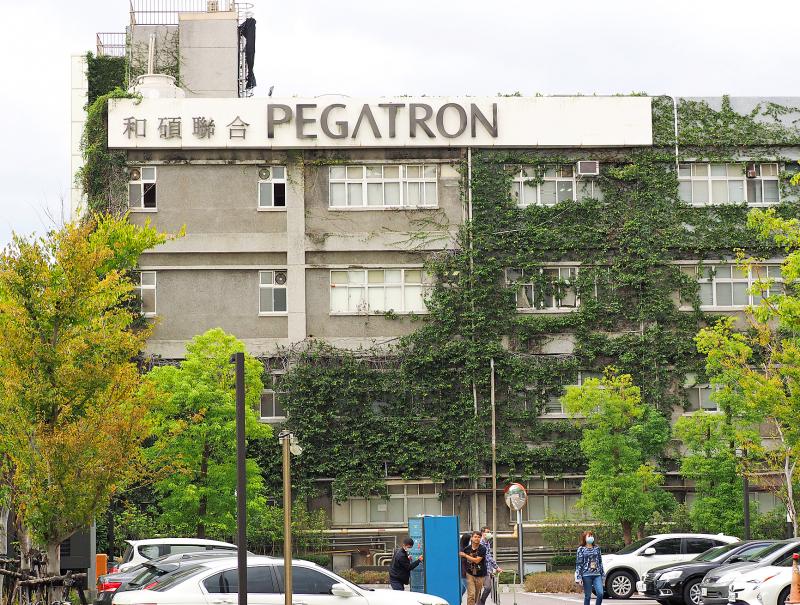Pegatron Corp (和碩), which assembles iPhones and notebook computers, yesterday slashed its forecast for notebook computer shipments to a quarterly decline of between 5 and 10 percent this quarter as China’s COVID-19 lockdowns suspended productions and upended supply chain logistics.
That compared with the company’s previous guidance of a quarterly increase of between 25 and 30 percent this quarter.
Shipments of desktop computers and motherboards would drop by between 30 and 35 percent this quarter from last quarter, Pegatron said.

Photo: David Chang, EPA-EFE
Non-notebook computer business is to see a quarterly decline as well, it said.
In the January-to-March quarter, Pegatron reported a 64.3 percent year-on-year decline in net profit to NT$1.67 billion (US$56 million), from NT$5.22 billion, hitting the lowest level in about 11 quarters.
NON-OPERATING LOSS
On a quarterly basis, net profit slumped 78.8 percent from NT$7.86 billion.
The weak performance was due to a non-operating loss of NT$449 million, mainly due to value impairment from its shareholding of China’s Luxshare Precision Industry Co (立訊精密). Pegatron holds about 0.57 percent of Luxshare.
Pegatron booked non-operating gains of NT$1.6 billion a year earlier and NT$3.59 billion in the previous quarter, company data showed.
Operating income surged 90.7 percent annually to NT$4.23 billion last quarter, but plunged 45.6 percent from NT$7.77 billion the previous quarter.
First-quarter revenue contracted 28 percent quarterly, but surged 49 percent annually to NT$324 billion last quarter, with communications products acounting for 60 percent of total sales, it said.
CAPACITY EXPANSION
To boost capacity, Pegatron’s board of directors yesterday approved an additional investment of US$50.61 million in its US manufacturing facilities.
That followed the board’s approval in November last year of a proposal to invest US$164 million to expand its US plant.
The board also approved additional investment of US$40 million in its US subsidiary, Pegatron Electronics Inc, the company said in a regulatory filing.

CHANGING JAPAN: Nvidia-powered AI services over cellular networks ‘will result in an artificial intelligence grid that runs across Japan,’ Nvidia’s Jensen Huang said Softbank Group Corp would be the first to build a supercomputer with chips using Nvidia Corp’s new Blackwell design, a demonstration of the Japanese company’s ambitions to catch up on artificial intelligence (AI). The group’s telecom unit, Softbank Corp, plans to build Japan’s most powerful AI supercomputer to support local services, it said. That computer would be based on Nvidia’s DGX B200 product, which combines computer processors with so-called AI accelerator chips. A follow-up effort will feature Grace Blackwell, a more advanced version, the company said. The announcement indicates that Softbank Group, which until early 2019 owned 4.9 percent of Nvidia, has secured a

TECH SECURITY: The deal assures that ‘some of the most sought-after technology on the planet’ returns to the US, US Secretary of Commerce Gina Raimondo said The administration of US President Joe Biden finalized its CHIPS Act incentive awards for Taiwan Semiconductor Manufacturing Co (TSMC, 台積電), marking a major milestone for a program meant to bring semiconductor production back to US soil. TSMC would get US$6.6 billion in grants as part of the contract, the US Department of Commerce said in a statement yesterday. Though the amount was disclosed earlier this year as part of a preliminary agreement, the deal is now legally binding — making it the first major CHIPS Act award to reach this stage. The chipmaker, which is also taking up to US$5 billion

CARBON REDUCTION: ‘As a global leader in semiconductor manufacturing, we recognize our mission in environmental protection,’ TSMC executive Y.P. Chyn said Taiwan Semiconductor Manufacturing Co (TSMC, 台積電), the world’s biggest contract chipmaker, yesterday launched its first zero-waste center in Taichung to repurpose major manufacturing waste, which translates into savings of NT$1.5 billion (US$46 million) in environmental costs a year. The environmental cost savings include a carbon reduction benefit of 40,000 tonnes, equivalent to the carbon offset of over 110 Daan Forest Parks, the chipmaker said. The Taichung Zero Waste Manufacturing Center is part of the chipmaker’s greater efforts to reach its net zero emissions goal in 2050, aligning with the UN’s 12th Sustainable Development Goal. The center could reduce TSMC’s outsourced waste processing

TRADE WAR: Tariffs should also apply to any goods that pass through the new Beijing-funded port in Chancay, Peru, an adviser to US president-elect Donald Trump said A veteran adviser to US president-elect Donald Trump is proposing that the 60 percent tariffs that Trump vowed to impose on Chinese goods also apply to goods from any country that pass through a new port that Beijing has built in Peru. The duties should apply to goods from China or countries in South America that pass through the new deep-water port Chancay, a town 60km north of Lima, said Mauricio Claver-Carone, an adviser to the Trump transition team who served as senior director for the western hemisphere on the White House National Security Council in his first administration. “Any product going